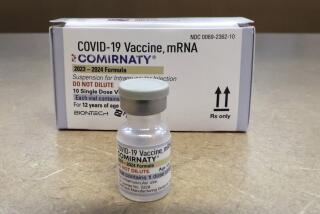Anti-Blood Clot Therapy Urged : Preventive Measures Are Under-Used, Experts Say
- Share via
All surgery patients over age 40 should receive drugs or physical therapy to prevent blood clots in the lungs, a complication resulting from operations and some other illnesses that kills 50,000 to 100,000 Americans each year, a federal medical advisory panel recommended Wednesday.
Such preventive measures are significantly under-used, a panel of experts assembled by the National Institutes of Health concluded after a three-day meeting in Bethesda, Md.
“The available data justify the routine prophylaxis (preventive treatment) of all surgical patients in high-risk situations,” the panel stated.
Such patients were defined as those over 40 and those of any age who are obese, have had tumors, a history of blood clots or are undergoing complicated operations.
The federal recommendations cover the use of medicines and physical therapies to prevent blood clots in the legs, called venous thrombosis, and the spread of a piece of the blood clot through the veins to the lungs, called pulmonary embolism.
The recommendations are designed in particular to educate physicians and the public about pulmonary emboli, the third most frequent cause of death in the United States, after cancer and cardiovascular disease.
“It is absolutely true that we have excellent treatments to prevent pulmonary emboli,” said Dr. Samuel Skootsky, director of the internal medicine consultation service at UCLA Medical Center. Such preventive measures are considered far superior to treatments after the complications develop.
The 14-member federal panel, one of a continuing series of NIH “consensus development conferences,” was chaired by Dr. Harold Roberts, chief of hematology at the University of North Carolina School of Medicine. The conferences are intended to bring together experts in various medical fields to develop national recommendations for treatment and research.
Follow Inactivity
Physicians believe that blood clots develop in the veins of the calf following periods of inactivity such as bed rest following surgery, and then spread in some patients to the thigh. Symptoms include pain, redness and swelling in the legs and chest pain, shortness of breath and fainting from blood clots in the lungs.
Patients at highest risk include elderly patients who have fractured hips; without the recommended treatments, as many as 40% of such patients could be expected to develop venous thrombosis, and 4% would die, according to the panel. Other groups at high risk include those with spinal cord injuries and medical patients with heart attacks and strokes.
The treatments outlined by the panel include drugs such as heparin, warfarin and dextran, and physical therapies such as early walking after surgery, elastic stockings and compression of the calves with an external pressurized boot. Such treatments should generally begin immediately before or after surgery and be continued until the patient is ambulatory.
“None of these preventive measures is ideal but most are relatively simple to use,” the panel concluded.
Lack ‘Good Studies’
“Most experts feel that these treatments are widely under-used,” UCLA’s Skootsky said in an interview. But he acknowledged that physicians “don’t have good studies” to prove this. The report released Wednesday cited no statistical evidence that such treatments are under-used.
The panel asserted that if, for example, 200 surgical patients were properly treated, 20 episodes of venous thrombosis and two cases of pulmonary embolism could be prevented.
Venous thrombosis and pulmonary emboli account for 300,000 to 600,000 hospitalizations a year in the United States, according to the panel. Patients require high doses of intravenous blood-thinning medicines followed by at least several months of pills after leaving the hospital. These medicines can cause bleeding and other complications.
In contrast, the side effects of treatments to prevent the blood clots are “generally minor,” according to the panel. Physicians, however, may be overly fearful of complications from the recommended treatments, Roberts told reporters Wednesday.
More to Read
Sign up for Essential California
The most important California stories and recommendations in your inbox every morning.
You may occasionally receive promotional content from the Los Angeles Times.









